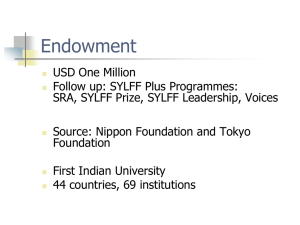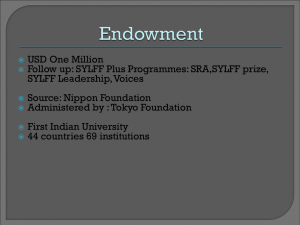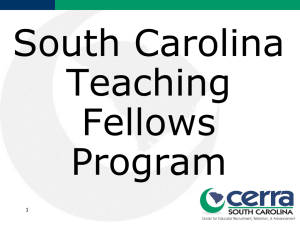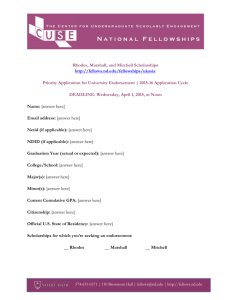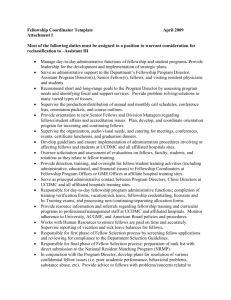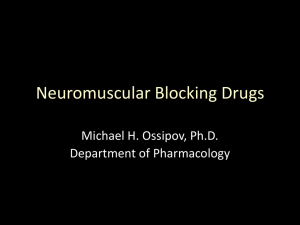Neuromuscular Medicine
advertisement
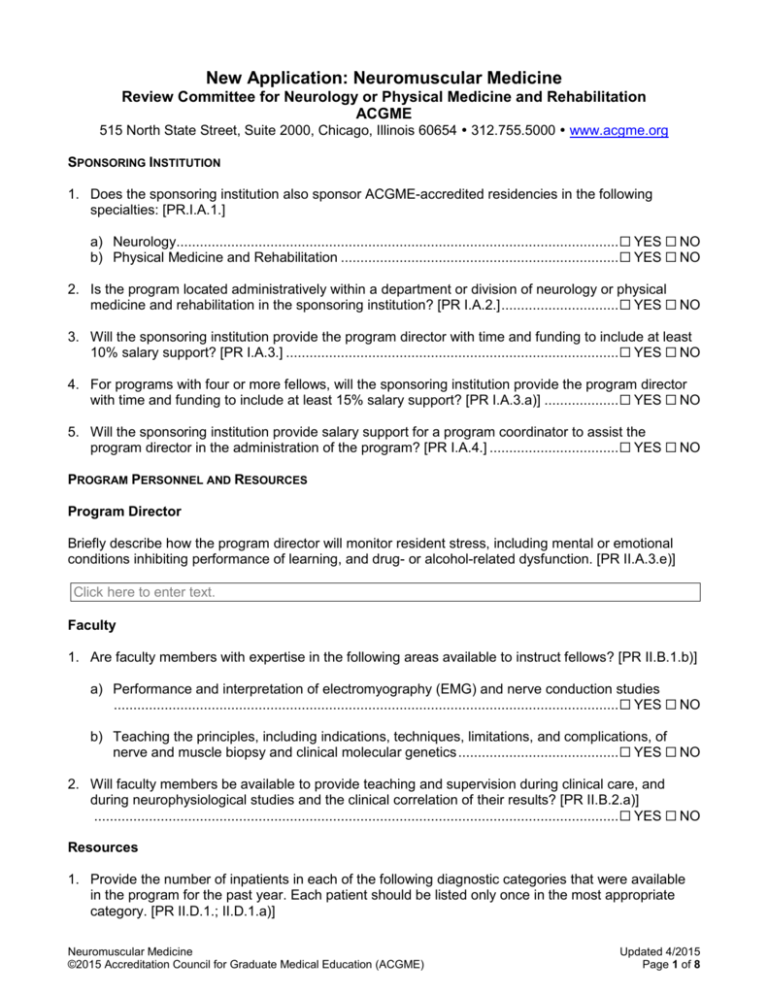
New Application: Neuromuscular Medicine Review Committee for Neurology or Physical Medicine and Rehabilitation ACGME 515 North State Street, Suite 2000, Chicago, Illinois 60654 312.755.5000 www.acgme.org SPONSORING INSTITUTION 1. Does the sponsoring institution also sponsor ACGME-accredited residencies in the following specialties: [PR.I.A.1.] a) Neurology................................................................................................................. ☐ YES ☐ NO b) Physical Medicine and Rehabilitation ....................................................................... ☐ YES ☐ NO 2. Is the program located administratively within a department or division of neurology or physical medicine and rehabilitation in the sponsoring institution? [PR I.A.2.] .............................. ☐ YES ☐ NO 3. Will the sponsoring institution provide the program director with time and funding to include at least 10% salary support? [PR I.A.3.] ..................................................................................... ☐ YES ☐ NO 4. For programs with four or more fellows, will the sponsoring institution provide the program director with time and funding to include at least 15% salary support? [PR I.A.3.a)] ................... ☐ YES ☐ NO 5. Will the sponsoring institution provide salary support for a program coordinator to assist the program director in the administration of the program? [PR I.A.4.] ................................. ☐ YES ☐ NO PROGRAM PERSONNEL AND RESOURCES Program Director Briefly describe how the program director will monitor resident stress, including mental or emotional conditions inhibiting performance of learning, and drug- or alcohol-related dysfunction. [PR II.A.3.e)] Click here to enter text. Faculty 1. Are faculty members with expertise in the following areas available to instruct fellows? [PR II.B.1.b)] a) Performance and interpretation of electromyography (EMG) and nerve conduction studies ................................................................................................................................. ☐ YES ☐ NO b) Teaching the principles, including indications, techniques, limitations, and complications, of nerve and muscle biopsy and clinical molecular genetics ......................................... ☐ YES ☐ NO 2. Will faculty members be available to provide teaching and supervision during clinical care, and during neurophysiological studies and the clinical correlation of their results? [PR II.B.2.a)] ...................................................................................................................................... ☐ YES ☐ NO Resources 1. Provide the number of inpatients in each of the following diagnostic categories that were available in the program for the past year. Each patient should be listed only once in the most appropriate category. [PR II.D.1.; II.D.1.a)] Neuromuscular Medicine ©2015 Accreditation Council for Graduate Medical Education (ACGME) Updated 4/2015 Page 1 of 8 Dates Click here to enter a date. Site #1 Adult Child Clinical Teaching - Inpatient Myopathies # # Neuropathies # # NMJ disorders # # Motor neuron # # diseases NMM in intensive care # # units Consultation Myopathies # # Neuropathies # # NMJ disorders # # Motor neuron # # diseases NMM in intensive care # # units Total # # Outpatient Myopathies # # Neuropathies # # NMJ disorders # # Motor neuron # # diseases Total # # to Site #2 Adult Child Click here to enter a date. Site #3 Adult Child Site #4 Adult Child # # # # # # # # # # # # # # # # # # # # # # # # # # # # # # # # # # # # # # # # # # # # # # # # # # # # # # # # # # # # # # # # # # # # # # # # # # # # # # # # # # # # # # # # # # # # # # # # 2. Use the table below to list the following office space and resources. Sites are identified and numbered in ADS. [PR II.D.1.b)] Faculty Offices and Facilities Neuromuscular Medicine Faculty Offices Secretary Office space for Neuromuscular Medicine Fellow Offices and Resources Do fellows have access to adequate workspace? Are there offices for fellows? Site #1 Site #2 Site #3 ☐ YES ☐ NO ☐ YES ☐ NO ☐ YES ☐ NO ☐ YES ☐ NO ☐ YES ☐ NO ☐ YES ☐ NO ☐ YES ☐ NO ☐ YES ☐ NO ☐ YES ☐ NO ☐ YES ☐ NO ☐ YES ☐ NO ☐ YES ☐ NO EDUCATIONAL PROGRAM Patient Care Neuromuscular Medicine ©2015 Accreditation Council for Graduate Medical Education (ACGME) Updated 4/2015 Page 2 of 8 Indicate the settings and activities in which fellows will demonstrate competence in the following areas of patient care. Also indicate the method(s) that will be used to assess competence. Competency Area Settings/Activities Assessment Method(s) Evaluating and managing patients with a wide range of diseases, including Anterior horn cell disease Click here to enter text. Click here to enter text. [PR IV.A.2.a).(2).(a).(i)] Cranial neuropathy Click here to enter text. Click here to enter text. [PR IV.A.2.a).(2).(a).(ii)] Myopathy Click here to enter text. Click here to enter text. [PR IV.A.2.a).(2).(a).(iii)] Neuromuscular junction disorders Click here to enter text. Click here to enter text. [PR IV.A.2.a).(2).(a).(iv)] Plexopathy, mononeuropathy, and Click here to enter text. Click here to enter text. polyneuropathy [PR IV.A.2.a).(2).(a).(v)] Radiculopathy Click here to enter text. Click here to enter text. [PR IV.A.2.a).(2).(a).(vi)] Evaluation and management of patients with a wide variety of disorders of the muscle, neuromuscular junction, nerve, and motor neuron, including Interviewing and examining Click here to enter text. Click here to enter text. patients with neuromuscular diseases [PR IV.A.2.a).(2).(b).(i)] Differential diagnosis for the Click here to enter text. Click here to enter text. various clinical presentations of neuromuscular problems [PR IV.A.2.a).(2).(b).(ii)] Use of the appropriate Click here to enter text. Click here to enter text. investigations for diagnosis of neuromuscular disorders, including laboratory, pathologic, radiologic, and electrodiagnostic/neurophysiologic testing [PR IV.A.2.a).(2).(b).(iii)] Skills to manage inpatients and Click here to enter text. Click here to enter text. outpatients with neuromuscular diseases [PR IV.A.2.a).(2).(b).(iv)] Medical Knowledge Indicate the activity(ies) (lectures, conferences, journal clubs, clinical teaching rounds, etc.) in which fellows will demonstrate competence in their knowledge in each of the following areas. Also indicate the method(s) that will be used to assess resident competence. Competency Area Settings/Activities Must demonstrate competence in their knowledge of Neuromuscular Medicine ©2015 Accreditation Council for Graduate Medical Education (ACGME) Assessment Method(s) Updated 4/2015 Page 3 of 8 Competency Area Application and understanding of nerve and muscle biopsy, molecular and genetic tests, and electrophysiologic testing [PR IV.A.2.b).(1).(a)] Differential diagnosis for a wide range of neuromuscular problems [PR IV.A.2.b).(1).(b)] All available treatments, and awareness of their risks and benefits [PR IV.A.2.b).(1).(c)] Clinical evaluation and management of patients of all ages with neuromuscular disorders in inpatient and outpatient settings [PR IV.A.2.b).(2)] Integrating information obtained from patient history, physical examination, and diagnostic testing (including electrodiagnosis, biopsy, immunological and molecular tests) to arrive at an accurate and timely diagnosis and treatment plan [PR IV.A.2.b).(3)] Use of all available treatments (e.g., immunomodulatory agents) and awareness of their side effect [PR IV.A.2.b).(4)] Rehabilitation aspects of neuromuscular disorders, neuroanatomy, neurophysiology, neuropathology, and safety issues related to diagnostic testing [PR IV.A.2.b).(5)] Nerve conduction and EMG studies, including neuromuscular junction testing, and the pathology of nerve and muscle biopsies [PR IV.A.2.b).(6)] Settings/Activities Click here to enter text. Assessment Method(s) Click here to enter text. Click here to enter text. Click here to enter text. Click here to enter text. Click here to enter text. Click here to enter text. Click here to enter text. Click here to enter text. Click here to enter text. Click here to enter text. Click here to enter text. Click here to enter text. Click here to enter text. Click here to enter text. Click here to enter text. Practice-based Learning and Improvement Neuromuscular Medicine ©2015 Accreditation Council for Graduate Medical Education (ACGME) Updated 4/2015 Page 4 of 8 1. Briefly describe one planned quality improvement activity or project that will allow fellows to demonstrate an ability to analyze, improve, and change practice or patient care. Describe planning, implementation, evaluation, and provisions of faculty member support and supervision that will guide this process. [PR IV.A.2.c).(1)] (Limit response to 400 words) Click here to enter text. 2. Briefly describe one example of a learning activity in which residents engage to develop the skills needed to locate, appraise, and assimilate evidence from scientific studies and apply it to their patients' health problems. [PR IV.A.2.c).(2)] (Limit response to 400 words) The description should include: Locating information Appraising information Assimilating evidence information (from scientific studies) Applying information to patient care Click here to enter text. Interpersonal and Communication Skills 1. Briefly describe one learning activity in which fellows demonstrate interpersonal and communication skills that result in the effective exchange of information and collaboration with patients, their families, and health professionals. [PR IV.A.2.d)] (Limit response to 400 words) Click here to enter text. 2. Briefly describe one learning activity in which fellows will teach neuromuscular medicine to other residents, medical students, nurses, and other health care personnel. [PR IV.A.2.d).(1)] (Limit response to 400 words) Click here to enter text. Professionalism Briefly describe the learning activity(ies), other than lecture, by which residents develop a commitment to carrying out professional responsibilities and an adherence to ethical principles. [PR IV.A.2.e)] (Limit response to 400 words) Click here to enter text. Systems-based Practice Briefly describe the learning activity(ies) by which fellows will demonstrate an awareness of and responsiveness to the larger context and system of health care, as well as the ability to call effectively on other resources in the system to provide optimal health care. [PR IV.A.2.f)] (Limit response to 400 words) Click here to enter text. Curriculum Organization and Fellow Experiences Neuromuscular Medicine ©2015 Accreditation Council for Graduate Medical Education (ACGME) Updated 4/2015 Page 5 of 8 1. Briefly describe the manner in which the program director and faculty members will prepare and implement a comprehensive, well-organized, and effective curriculum, both academic and clinical, which includes the presentation of core subspecialty knowledge supplemented by the addition of current information. [PR IV.A.3.a).(1)] Click here to enter text. 2. Briefly describe the manner in which the program will ensure that fellows are provided opportunity to observe nerve conduction and EMG studies (including neuromuscular junction testing and safety issues related to diagnostic testing) and the pathology of nerve and muscle biopsy. Include a description of opportunities that will be available for fellows to observe nerve and muscle biopsies. [PR IV.A.3.b).(1)] Click here to enter text. 3. Briefly describe the manner in which the program will ensure that fellows gain experience in the inpatient management and evaluation of patients presenting with acute and severe neuromuscular disorders. [PR IV.A.3.c).(1)] Click here to enter text. 4. Briefly describe the manner in which the program will ensure that fellows are provided with experience in critical care management of patients with conditions such as myasthenic crisis and acute and severe Guillain-Barre syndrome. [PR IV.A.3.c).(2)] Click here to enter text. 5. Briefly describe the opportunities for fellows to gain experience in the outpatient evaluation and diagnosis of patients with non-emergent neuromuscular disease manifestations. [PR IV.A.3.c).(3)] Click here to enter text. 6. Briefly describe how fellows will gain experience in the ordering and clinical interpretation of electrophysiologic studies and their role in the diagnosis and management of patients. [PR IV.A.3.c).(4)] Click here to enter text. 7. Briefly describe how fellows will gain experience in the ordering and clinical interpretation of diagnostic blood tests, including those involving molecular genetic testing. [PR IV.A.3.c).(5)] Click here to enter text. 8. Briefly describe how fellows will gain experience consulting with other medical professionals, including cardiologists, radiologists, rheumatologists, pediatricians, neurological surgeons, pathologists or neuropathologists, and physiatrists in the overall care and management of patients with neuromuscular disorders. [PR IV.A.3.c).(6)] Click here to enter text. 9. List didactic lectures and courses in neuromuscular medicine. Indicate with an asterisk which lectures are mandatory for the fellows. [PR IV.A.3.d)] Neuromuscular Medicine ©2015 Accreditation Council for Graduate Medical Education (ACGME) Updated 4/2015 Page 6 of 8 Click here to enter text. 10. List neuromuscular medicine clinical conferences. Indicate which conferences are mandatory for the fellows. [PR IV.A.3.d).(1)] Click here to enter text. Fellows’ Scholarly Activities 1. Briefly describe how the curriculum will advance fellows’ knowledge of the basic principles of evidence-based medicine and research, including how research is conducted, evaluated, explained to patients, and applied to patient care. [PR IV.B.1.] Click here to enter text. 2. Will fellows participate in scholarly activity under the mentorship of program faculty members? [PR IV.B.2.] ................................................................................................................... ☐ YES ☐ NO If NO, explain. Click here to enter text. 3. Briefly describe the educational resources that will be allocated by the sponsoring institution and the program to facilitate fellow involvement in scholarly activity. [PR IV.B.3.] Click here to enter text. 4. Will fellows receive support to attend one regional, national, or international professional conference during the program? [PR IV.B.4.] .................................................................................. ☐ YES ☐ NO If NO, explain. Click here to enter text. EVALUATION Fellow Evaluation 1. Will the members of the faculty review a representative sample of fellows’ written patient records? ...................................................................................................................................... ☐ YES ☐ NO 2. Will the members of the faculty provide feedback to fellows on audits of their written patient records? ......................................................................................................................... ☐ YES ☐ NO 3. Briefly describe how and by whom feedback to fellows will be provided and what remedial actions are taken in cases of deficiency. What kind of records of fellow evaluations does the program maintain? [PR V.A.2.c); V.A.3.b).(1)] Click here to enter text. 4. Describe the process which will be used by the program to deal with impaired fellows. Click here to enter text. Neuromuscular Medicine ©2015 Accreditation Council for Graduate Medical Education (ACGME) Updated 4/2015 Page 7 of 8 Program Evaluation and Improvement 1. Is there a written curriculum for each learning experience of more than one FTE month? ...................................................................................................................................... ☐ YES ☐ NO 2. Describe the criteria which will be used in assessing the extent to which these goals and objectives are met. Click here to enter text. 3. Describe the frequency and the mechanism by which these will be distributed to residents and faculty members. Click here to enter text. 4. Briefly describe how the performance by graduates on the certifying examinations will be used to evaluate the effectiveness of the program and to modify its goals and objectives. [PR V.C.4.] Click here to enter text. Neuromuscular Medicine ©2015 Accreditation Council for Graduate Medical Education (ACGME) Updated 4/2015 Page 8 of 8
